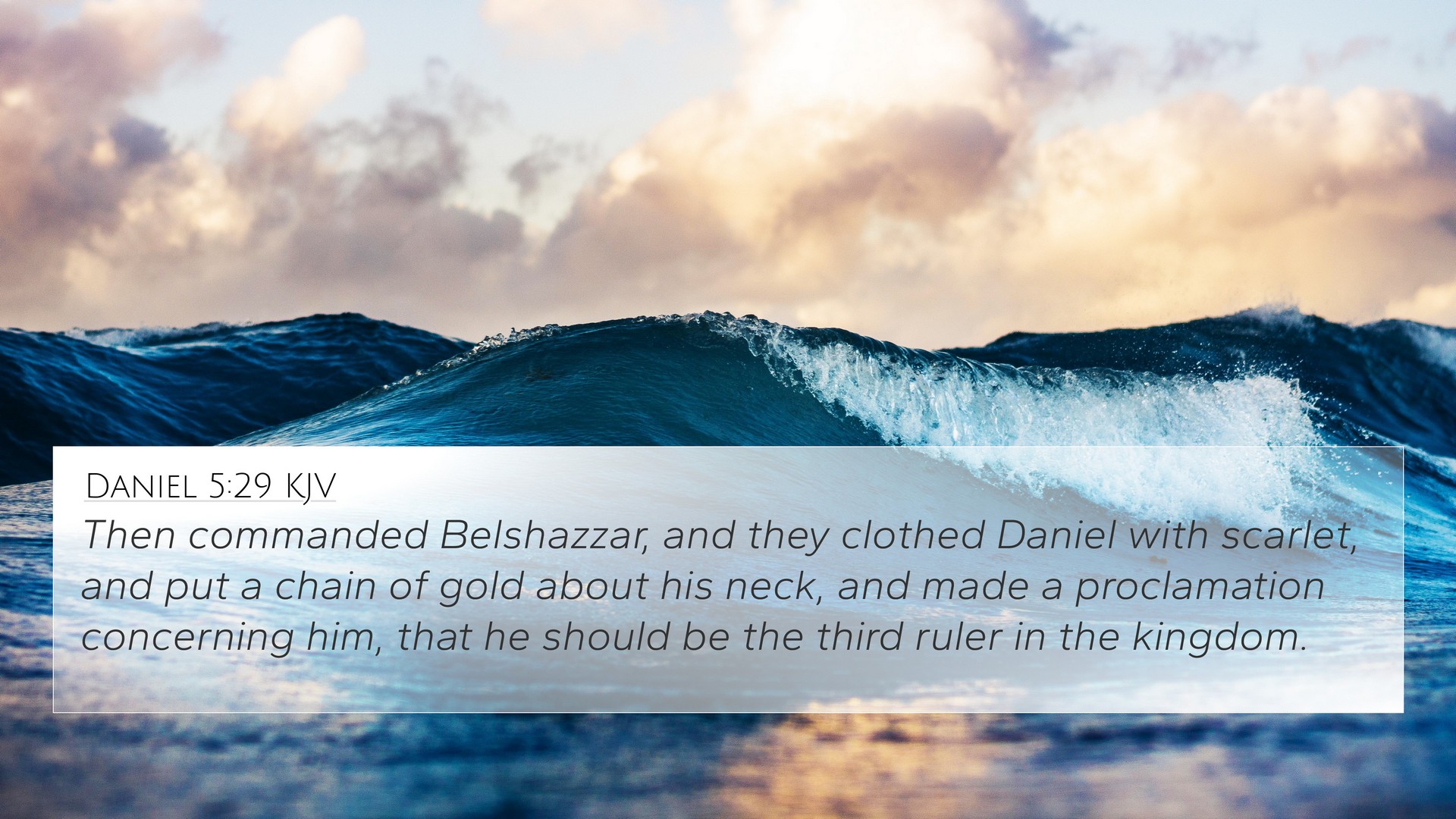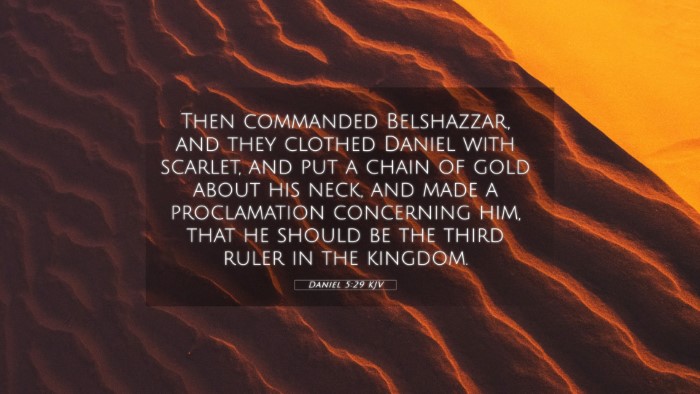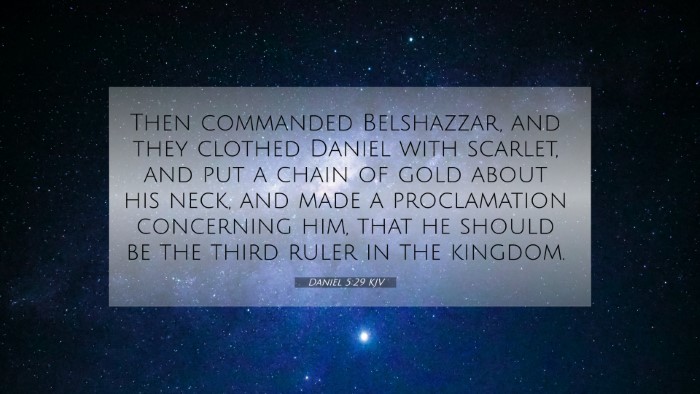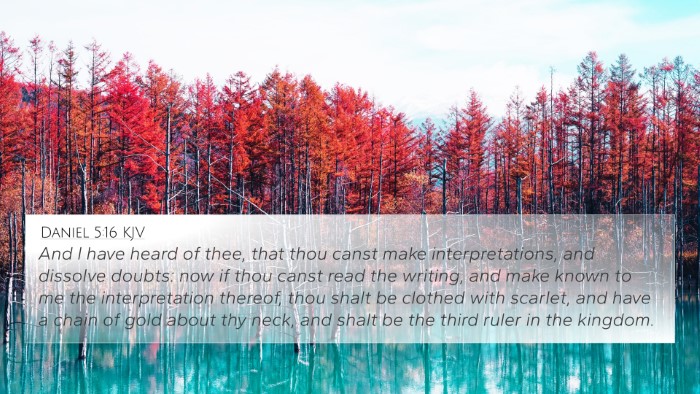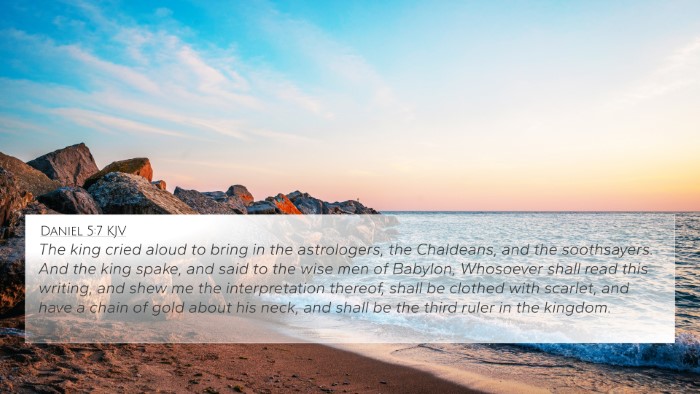Understanding Daniel 5:29
Daniel 5:29 states, "Then commanded Belshazzar, and they clothed Daniel with scarlet, and put a chain of gold about his neck, and made a proclamation concerning him, that he should be the third ruler in the kingdom." This moment captures a pivotal scene from the Book of Daniel during King Belshazzar's feast and is rich with theological significance.
Summarized Meaning and Interpretation
In this verse, we find Daniel, a faithful servant of God, called upon to interpret the mysterious writing that appeared during a feast hosted by King Belshazzar. His interpretation revealed God's judgment upon the king and foreshadowed the fall of Babylon.
Commentary Insights
-
Matthew Henry: Henry sees Daniel's elevation in the kingdom as God's provision and reward for his faithfulness amidst adversity. Despite the king's sacrilege, God’s sovereignty prevails, and Daniel is honored among those who have defied God.
-
Albert Barnes: Barnes emphasizes that Daniel’s appointment, even as the third ruler, serves to highlight the fleeting nature of human power. Barnes reflects on how this act was more about God's message than personal acclaim, reinforcing that God promotes His servants as He wills.
-
Adam Clarke: Clarke points out that the clothing of Daniel with scarlet and the gold chain symbolize honor and responsibility, yet they contrast sharply with the impending doom of the kingdom. It serves as a poignant reminder of the transient glory of earthly honors when faced with divine judgment.
Biblical Cross References
This verse connects deeply with various themes found throughout the Scriptures:
- Jeremiah 25:9: God foretells the invasion of Babylon, illustrating the impending consequences for their pride and idolatry.
- Isaiah 47:1-3: The prophecy against Babylon speaks to its future downfall, underscoring the fulfillment of God's judgment.
- Revelation 17:5: The reference to Babylon the Great serves as a thematic link to the judgment and fall of worldly powers.
- Daniel 2:48-49: Earlier, Daniel is promoted by Nebuchadnezzar, establishing a parallel between Daniel's consistent service to God and his recognition by earthly kings.
- Proverbs 16:18: "Pride goes before destruction," resonates with Belshazzar's arrogance leading to Babylon's downfall.
- Ezekiel 18:30: Calls for repentance, showing God's desire for His people to turn from sin before judgment arrives.
- Acts 5:29: The apostles' declaration to obey God rather than men reflects Daniel's integrity in serving God amidst a corrupt leadership.
Thematic Connections and Reflections
Daniel 5:29 serves not only as a historical account but highlights thematic connections visible throughout the biblical narrative:
-
God's Sovereignty: The promotion of Daniel signifies God's control over earthly rulers. It affirms that ultimately, God's plans prevail despite human actions.
-
Judgment and Mercy: The imagery of wearing royal garments emphasizes God's mercy towards Daniel, juxtaposed against the judgment imminent on Belshazzar.
-
Faithfulness amidst Adversity: Daniel’s unwavering faith is rewarded even in a foreign and hostile environment, offering a model for believers today.
Tools for Cross-Referencing Bible Verses
For those looking to study this verse in relation to others, here are some resources:
- Bible concordance
- Bible cross-reference guide
- Online Bible cross-reference tools
- Comparative Bible verse analysis services
- Apps and software dedicated to cross-referencing scriptures
Conclusion
In examining Daniel 5:29, we see the immediate practical outcomes of divine revelation met with human pride. Understanding the implications of this narrative requires a careful cross-examination against broader biblical themes and connections. By employing comprehensive Bible cross-reference methods, we can deepen our understanding of how God's sovereignty is woven throughout His Word.
